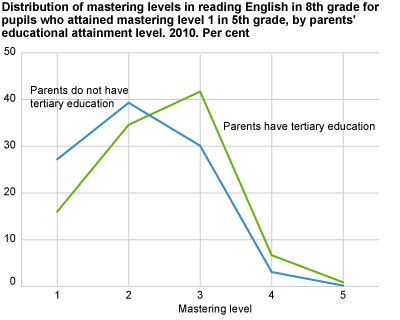Content
Published:
This is an archived release.
Level of education has impact on results
National tests held during 2010 show that pupil achievement in 8th grade is highly correlated with results from 5th grade. Pupils who have parents with tertiary education are more likely to improve their results from 5th to 8th grade compared with other pupils.
For the first time it is possible to compare the results from 8th grade with the results of the same pupils from 5th grade, three years earlier. The main finding of the comparison is that pupils who were at the lowest mastering level in 5th grade, to a large degree remained at a low mastering level in 8th grade. The latter tendency is most evident in mathematics, where 67 per cent of those who had the lowest mastering level in 5th grade, remained on a low level in 8th grade. Similarly, very few pupils who achieved the highest mastering level in 5th grade achieved a low level in 8th grade.
|
The mastering levels given in national tests in 5th grade and 8th grade are not directly comparable. The 5th grade tests have three mastering levels, whereas the tests in 8th grade have five mastering levels. In order to make it easier to compare the results between the two different grades, a “low level” in 8th grade will here by definition mean the same as mastering level 1 or 2, a “medium level” in 8th grade will mean 3, and a “high level” in 8th grade will mean 4 or 5. |
Parents’ level of education has impact on improvement
As observed in previous years, there is a positive correlation between parental level of education and achieved test results. Pupils who have parents with tertiary education are more likely to achieve a high mastering level in all tests compared with other pupils. The national tests of 2010 also imply that pupils who have parents with tertiary education are more likely to improve test results from 5th to 8th grade compared with other pupils. Half of all pupils who have parents with tertiary education and achieved the lowest mastering level in English in 5th grade were able to achieve medium or high mastering level in 8th grade. In contrast, only a third of pupils who do not have parents with tertiary education did the same. Similar differences can be observed in reading Norwegian and mathematics. Pupils who have parents with tertiary education are also more likely to maintain a high mastering level from 5th grade to 8th grade.
Improvement in 9th grade
In the national tests 2010, 8th grade and 9th grade pupils were given the same tests in reading Norwegian and mathematics. A comparison between the test results of the two grades shows that pupils in 9th grade achieved higher results on both tests, most notably in reading Norwegian. Whereas one third of all pupils in 8th grade achieved a high level in reading Norwegian, half of all pupils in 9th grade did the same.
|
The results of the national tests are here presented as proportions at different mastering levels. The tests in 5th grade range from 1 to 3 (3 is highest), whereas the tests in 8th and 9th grades range from 1 to 5 (5 is highest). More detailed information about the levels and boundaries between levels is available in About the statistics . |
Tables:
- Table 1 Distribution of pupils by mastering levels in national tests in 5th grade, by parents' educational attainment level and the centrality of pupils' school municipality. 2009-2010. Per cent
- Table 2 Distribution of pupils by mastering levels in national tests in 8th grade, by parents' educational attainment level and the centrality of pupils' school municipality. 2009-2010. Per cent
- Table 3 Distribution of pupils by mastering levels in national tests in 5th grade, by gender and parents' educational attainment level. 2009-2010. Per cent
- Table 4 Distribution of pupils by mastering levels in national tests in 8th grade, by gender and parents' educational attainment level. 2009-2010. Per cent
- Table 5 Distribution of pupils by mastering levels in national tests in 5th grade, by gender and immigration category. 2009-2010. Per cent
- Table 6 Distribution of pupils by mastering levels in national tests in 8th grade, by gender and immigration category. 2009-2010. Per cent
- Table 7 Distribution of pupils by mastering levels in national tests in 8th grade, by parents' educational attainment level and the pupils' mastering level in 5th grade in 2007. 2010. Per cent
- Table 8 Distribution of pupils by mastering levels in national tests in 8th grade and 9th grade. 2010. Per cent
The statistics is now published as Marks and national tests, lower secondary school.

